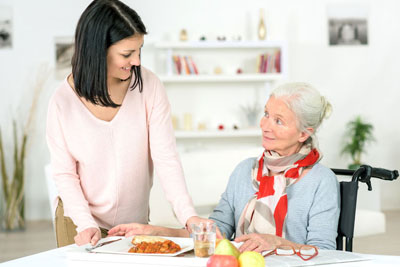 With the severe impact that the coronavirus is having on adults age 60 and older, it’s a scary time to be a caregiver for an aging parent or family member. However, there are steps you can take to protect your health and theirs. Here are some key strategies for caregiving amid COVID-19 to help keep you and your loved ones safe.
With the severe impact that the coronavirus is having on adults age 60 and older, it’s a scary time to be a caregiver for an aging parent or family member. However, there are steps you can take to protect your health and theirs. Here are some key strategies for caregiving amid COVID-19 to help keep you and your loved ones safe.
Follow CDC Guidelines
To minimize the risk of COVID-19 infection, follow all CDC-recommended protocols. Avoid non-essential travel and do not allow visitors into the home where your loved one is staying. Wash your hands frequently with soap and water for at least 20 seconds before and after providing care, preparing food, using the bathroom, or touching surfaces in public places. Keep your hands away from your face and clean frequently touched surfaces in the home often, including walkers, canes and handrails.
Postpone Non-Essential Doctor Visits
The last place anybody wants to be right now is in a hospital or doctor’s office, where the risk of exposure is elevated. This is especially true for seniors, who are much more susceptible to the virus. If your loved one is feeling well, talk to their doctors about postponing checkups, elective procedures and other non-essential doctor visits.
If the senior in your care can’t miss an appointment, find out if telemedicine is an option. Many physicians are now offering patients the choice to connect over video, phone or email, as an alternative to face-to-face visits, and Medicare and other insurance providers have expanded coverage to now include telemedicine.
Stock up on Necessities & Prescriptions
Make sure your loved one has 1-3 months of their prescription medications, and two weeks’ worth of food and over-the-counter medications in the house. If they normally shop for themselves, offer to shop for them, or use a delivery service instead. If you or your loved one must go out, check to see if any stores in your area have special shopping times for at-risk individuals and encourage seniors to shop then.
Plan Ahead
If you become COVID-19 positive, you will no longer be able to care for your loved one, so make sure you have a back-up plan in place. Finding last-minute in-home care will be difficult – and you’ll be in no condition to coordinate it once you become sick – which is why it’s important to work out arrangements with friends and family now, or look into the availability of respite care in your area, should you need it.
You’ll also want to make sure you have an up-to-date record of your loved one’s health history and a list of current prescription and over-the-counter medications on hand, as this will be helpful if your loved one becomes infected.
Prepare for a Possible Quarantine
In the event that your loved one develops symptoms or tests positive for the virus, you will need to manage a quarantine. How you prepare will depend on several factors, including the level of care your loved one normally requires (ie. how independent they are) and whether they are self-isolating in their own home or yours.
Regardless, you should make sure the infected individual stays in an isolated room away from others in the house, and anyone entering the room should wear protective masks, gloves and gowns. The infected should also use a separate bathroom and not share any personal items, such as dishes, towels and bedding. Monitor symptoms closely and keep your loved one’s medical team in the loop.
Practice Self-Care
Your loved one’s well-being is dependent on you staying healthy and safe, so make sure you are eating healthy, balanced meals, getting regular sleep, and exercising when possible. To keep both you and your loved one connected to friends and family during the coronavirus pandemic, schedule phone calls and video chats.
Remember, caregiver burnout can happen any time, but the risk is higher in times of increased stress. Make sure you take breaks and find opportunities to relax, even if it’s just to take a walk around the block, listen to your favorite music, read a book, or work on a hobby.
When Caregiving Becomes Too Much
During these uncertain times, caregiving for seniors has become increasingly challenging. If you are experiencing feelings of hopelessness, overwhelming anxiety, sleep problems, or are having difficulty coping with everyday tasks, it may be time to ask for help. Perhaps you just need a break for a few weeks, or maybe it’s time to find a long-term solution for your aging parent or loved one. Either way, Eddy Senior Living is here to support you in every way we can.
Learn more about our Respite Care in Troy, Slingerlands, East Greenbush, Niskayuna and Queensbury, or call (518) 280-8385 to inquire about current availability. We also provide permanent Enriched Housing & Assisted Living services, Skilled Nursing and specialized Memory Care.
